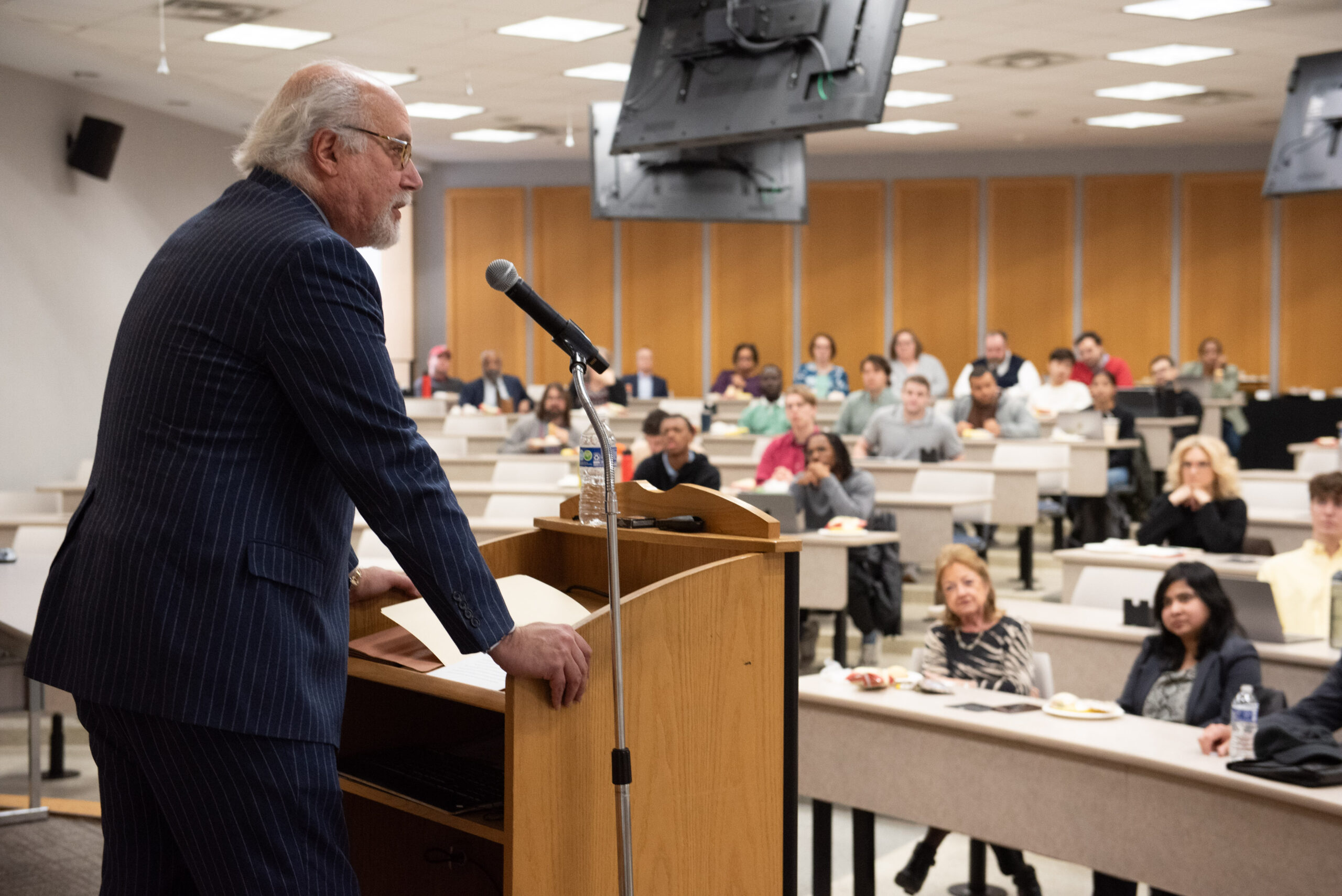As a law student focused on learning the ins and outs of corporate law, it can sometimes feel like the only goal that matters in business is the bottom line. Between fiduciary duties, profit-maximizing principles, and shareholder primacy, the space for societal good often feels like an afterthought—if it’s considered at all. So when I attended the 2025 Richard H. Walker ’75 Chair in Business Law Lecture on March 26, 2025, hosted by Professor Harwell Wells and featuring Gregory Varallo’ 83, I expected to hear about high-stakes litigation, maybe some war stories on practicing in Delaware, and definitely something about Elon Musk. I didn’t expect to walk away with a renewed sense of how corporate litigation—specifically settlements—can actually be a tool for meaningful, even moral, progress.
Varallo spent 36 years as a top corporate defense attorney before crossing the aisle to become a plaintiff-side litigator at Bernstein Litowitz Berger & Grossmann LLP. Most recently, he gained national attention for his work in Tornetta v. Musk, where he helped strike down Elon Musk’s $55.8 billion compensation package—a case that’s already reshaping the conversation around executive pay and shareholder power. But what stayed with me wasn’t just the headline-grabbing wins. It was Varallo’s view that corporate litigation can—and should—be about more than money. It can be about reform, about equity, and about social progress.
Throughout the conversation, Varallo walked the audience through major cases where litigation led to lasting corporate reform. He emphasized the power of creative settlement agreements—often overlooked or seen as compromises—as tools to drive meaningful and lasting societal change. One standout example involved a sexual discrimination case against Fox Corporation. Rather than simply negotiating a financial payout, the parties structured a settlement that required the creation of a Workplace Inclusion Council within the company. This council was given real authority: to oversee Fox’s internal compliance with workplace misconduct laws, and it was granted the ability to publish dissenting opinions directly in the company’s proxy statements. This format not only increases internal accountability but also brings governance issues into the public eye—shifting what’s normally a private resolution into a mechanism for transparency and reform. Creative settlement agreements illustrate to me how litigation—when approached creatively—can turn moments of corporate crisis into opportunities for cultural and institutional transformation. This model can be replicated in other settlements—proof that even within the traditionally conservative realm of corporate governance, change is possible when creative lawyering meets genuine advocacy. Varallo’s point was clear: settlements don’t have to be the end of a story. Sometimes, they’re the beginning of something better.
Varallo also discussed cases that involved larger questions of public trust and institutional accountability. In the FirstEnergy bribery scandal—described by federal prosecutors as the largest political corruption case in Ohio history—shareholders sued after the company funneled $60 million to state lawmakers in exchange for favorable legislation. The result? A $180 million recovery and the removal of six directors, along with governance reforms aimed at curbing political spending. The case wasn’t just about recovering losses, it was about restoring integrity to a system that had gone off the rails.
Even in cases where litigation didn’t end in a win, like AmerisourceBergen and its alleged role in the repackaging and distribution of pre-filled syringes that were not approved by the U.S. Food and Drug Administration, Varallo explained how lawsuits can expose damaging patterns of behavior, to raise public awareness, and to set the stage for future change. As a student, it reminded me that “losing” a case doesn’t always mean failure—sometimes it just means laying the groundwork.
In a more reflective moment, Varallo turned from advocating for legal practices to advocating for integrity. He emphasized the importance of an independent judiciary, pointing to Tornetta and similar cases as examples where courts valiantly resisted public and media pressure to uphold core principles of fiduciary accountability. Integrity, he advocated, is the most important quality in both boardrooms and courtrooms—and it’s something that cannot be contemplated but must be demanded. Whether you’re serving on a board, advising a client, or sitting on the bench, what ultimately matters is integrity. That stuck with me.
For students like me, the lecture offered more than case summaries. It was a powerful reminder that corporate litigation is not inherently finance-focused or purely adversarial. When shaped by people who care about long-term consequences and equity, the legal system can correct course—not just for companies, but for the communities they impact. In Greg
Varallo’s vision of the law, the courtroom, and settlement negotiations, can and should be a place not only for judgment, but for progress.
Author bio: Anthony Essick is a second-year law student at Temple University Beasley School of Law interested in pursuing a career in corporate transactional law.


